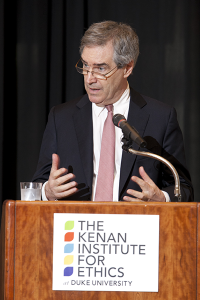Considering a Global Ethic

By Rachel Revelle
Last week we had the privilege of welcoming Kenan Distinguished Lecturer Michael Ignatieff, who spoke on “The Ethics of Globalization and the Globalization of Ethics.” The concept for the annual Kenan Distinguished Lecture in Ethics is to bring a notable speaker to campus to address moral issues of broad social and cultural significance. Ignatieff, as a Canadian scholar, author, and former politician, had a breadth of experience that we knew would be valuable for this signature event.
The trajectory of a truly global ethic, which acknowledges the contributions of all cultures, religions, and worldviews, was the structure of Ignatieff’s talk on Thursday, punctuated by specific moments of transformation that illuminated change. His article “Reimagining a Global Ethic” provides some background on the thesis. Amidst all the differences present in a global society, there must be a leveling of each person’s value and the recognition of equal moral concern for all humanity. How this has actually played out in history, and whether we’ve gotten to a point where there is this “global ethic”, is certainly complex. Part of the cleverness of the lecture was the way that the specific moments of transformation were emblematic for our collective thinking about ethics over time. It would be an interesting exercise to devise a parallel set of anecdotes to explore the globalization of ethics. But I’ll continue by sharing some of his.
We started back in 1580 with Michel de Montaigne’s essay Of Cannibals. In explaining that the globalization of ethics is tied to the history of empire, he said that Montaigne asked a critical new question of the moral imagination – he asked a cannibal what he thought of the French! In this act Montaigne considers what we can learn from another people rather than simply what they must learn from us. One of the answers was rather amusing – why do all you grown men with beards bow down to a child (the king)? Another was more unsettling – why do some people have plenty to eat while others not enough, and why do the hungry not attack and kill those with plenty? Reversing the lens brought attention to the existence of basic inequalities, which from certain outsiders’ perspectives seemed absurd.
We then jumped to the 20th century to explore another kind of inequality and injustice, that of Nazism as a perverse racialization of the law. Ignatieff shared a fascinating segment of Duke’s history about a Polish lawyer named Raphael Lemkin escaping Europe for the US because of the invitation of Duke Law professor Malcolm McDermott. In fighting this huge global inequality, part of what was needed was a name for what Churchill called “a crime without a name.” Lemkin provided the moral innovation of naming that crime genocide, and went on to draft the UN genocide convention. We may disagree about ethical principles in a diverse global society, but we must recognize and name what is incorrigibly wrong.
The civil rights movement was also highlighted as part of a global struggle to end unjust hierarchies. Broadly we see human rights emerge in the 20th century as a normative authority that it has not been in the past. With these and other pinpoints, Ignatieff gave us a longterm view of globalization and the evolution of moral ideas that have accompanied it. The message was overall inspiring. We still have a long way to go, but perhaps we have gotten to a place where there are no longer acceptable justifications for invidious inequalities and hierarchies amongst the human race.
I can’t help but wonder if this is too hopeful. But it helps to note the history from which we’ve come. It also helps to add Ignatieff’s final illustration, which was Aung San Suu Kyi’s work in Burma. His main point with her story was that ethics goes global by anchoring in the local. Suu Kyi is thought of as a global human rights icon, but her priority has always been to create change in her country, and she has only been able do that by suffering on the ground. Ethical principles are not taken into a place in the abstract, but rather by how they are lived and expressed in individual lives.
